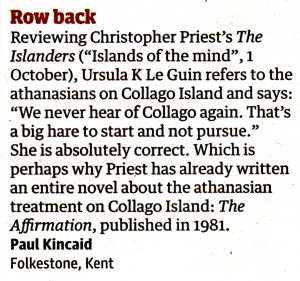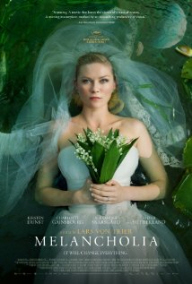When a newly published book is being reviewed the writer can find himself in a perverse and slightly frustrating position. There is a sort of convention under which the writer is expected to stay silent and not respond to published reviews, favourable or otherwise. A writer who breaks with the convention can look a bit of a prat: comment on a friendly one and you seem as if you’re preening yourself, but respond to a negative or hostile review and you appear to have been provoked, and are revealing an over-sensitive nature or hinting at an old feud that has been festering. The only possible excuse for a response is if the reviewer makes an error of fact, and then only if it is a serious error or a seriously misleading one. Otherwise, the best advice is to keep your trap shut.
That said, let’s head on into the night. Yesterday’s Guardian Review supplement carried a letter from Paul Kincaid, pointing out a small but intriguing mis-statement in Ursula Le Guin’s review in the Guardian of my new novel The Islanders. Le Guin had said that the reference to the island of Collago was ‘a big hare to start and not pursue’ – Kincaid corrected this, saying that The Affirmation, published in 1981, was an entire novel about Collago island and what goes on there. The hare had been not only started and pursued, but chased back into its own nest and beyond.
I had of course noticed this when I saw Le Guin’s review, but under the above convention felt it wasn’t my place to point it out. (So: many thanks to Paul Kincaid.) Anyway, it seemed obvious to me that Le Guin had either not read The Affirmation, or had forgotten all about it.
I saw no problem with that. The Affirmation came out more than thirty years ago, and no one can keep up with everything. Indeed, if the roles were now reversed and I were to review a new Le Guin book, I’d have the similar difficulty that I have not read any novel of hers since about, say, 1981. But her minor slip does open up an interesting connection with Le Guin herself.
There are two things I want to make clear about The Islanders. Firstly, it is not a sequel of any kind to earlier books or stories. Secondly, it is not a roman à clef.
On the first matter, The Islanders is intended to be read as a standalone novel: you don’t need a qualification in Priest books to follow it or enjoy it. It is of course a novel set in the Dream Archipelago, which I have written about before, but apart from a couple of short sections which were published while I was drafting the novel (one in Interzone, the other in an Ian Whates anthology) it is all new work, independent of everything else. True, there are a few references back to earlier stories, but they are small, irrelevant and inconsequential. If you miss them you miss nothing. If you want to go and hunt for them (mostly in the collection called The Dream Archipelago, but also in The Affirmation), you will probably find them, but will at once agree about the smallness, the irrelevance and the inconsequentiality. Neither the earlier work nor the new is changed or improved by these small sly references.
As for The Islanders being a roman à clef: it simply is not that. With one exception.
When in the mid-1970s Ursula Le Guin came to stay and work in Britain, I was eager to meet her. I was a young and growing writer – she was at that time a very good writer, but not yet a great writer. (Her impending greatness was clear to a small group of us who had followed her work, but she was then little known to the wider world.) We met several times and, I think and hope, we became friends. She struck me as a nice woman, intelligent, wise, humorous, imaginative, and by her example gave young writers like me much to aspire to.
In 1977 I was editing a new anthology for Faber & Faber and was having to write a story of my own to go into it. The result was a Dream Archipelago story called ‘The Negation’. In this a young writer (not in fact based on me, or even my own idea of myself) meets an older and more experienced writer. I gave her the name Moylita Kaine, and although she was not at all intended as a depiction of Ursula Le Guin, she had many of the qualities I had sensed in Le Guin: the wisdom, the warmth, etc. In the story, Moylita Kaine has earlier written the one novel which most inspired my young writer, and which had made him want to become a writer too. For the moment he is a conscript in wartime, serving as a member of the Border Police protecting his country, but he plans to start writing in earnest as soon as he is free.
Her novel, which he carries around in a battered old paperback, is called The Affirmation. At this time, my own novel of that name did not exist; I later co-opted the title for myself (thinking ‘why the hell not?’), but this means that in every way the title of the Kaine novel has priority over my own use of the same title.
The plot of the Kaine The Affirmation is loosely described in ‘The Negation’. It bears no resemblance to anything Le Guin ever wrote, and for that matter it is completely unlike the plot of my own The Affirmation, which came out some three or four years later. If anything, the plot description in the story gives an acknowledgement to a novel which had once had a similar inspirational effect on me: John Fowles’s The Magus.
I’ve no idea if Le Guin ever read ‘The Negation’, or if on reading it she might have recognized something of herself in the character, because by the time the story appeared she had returned to the USA and we were more or less out of contact. It didn’t matter: I intended it only as a harmless mention, a fond acknowledgement to someone I rather liked.
Moving on thirty years, we come to The Islanders. Moylita Kaine reappears.
She features in three parts of the novel. In the first, she is a young writer edging her way towards publication, and writing her own first novel. This turns out to be The Affirmation. (The cover image of the first edition is included in The Islanders Gallery.) You need not know about my earlier short story.
In her second appearance, Moylita Kaine has become a successful and well-known author: as yet very good rather than great. She has had to travel to a remote island in the Archipelago to collect the remains of a young Border Policeman, killed in an accident. You need not know about my earlier short story.
Finally, we hear about the writing of the one work that established her greatness: a novel called Hoel Vanil, ‘a novel in the form of a document’. (The cover image of this book also appears in The Islanders Gallery.)
There is absolutely no reason why Ursula Le Guin, reading these three short sections of a long novel, should identify any part of herself from them. Even so, I can’t help wondering that if she had known about or remembered the circumstances of ‘The Negation’, she alone in this world might have enjoyed the novel a little more than in reality she did.
The Le Guin review from the Guardian is here.
‘The Negation’ is one of the short stories in the collection The Dream Archipelago.
The Paul Kincaid letter does not appear to have a link, so here is a scan of it:


